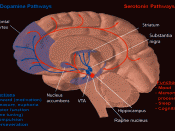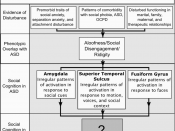Anorexia Nervosa is a condition of self imposed starvation and is most commonly experienced by females between 14 and 25 years of age who live in Western cultures. The essential characteristics of anorexia are weighing 25 percent less than expected weight, loss of menstruation, refusal to maintain minimal expected body weight, intense fear of gaining weight and distortions of self image (Moorey, 1991). In the last 100 years doctors and psychologists have tried to determine the cause of anorexia nervosa with no definitive answers. However, predisposing, precipitating and perpetuating factors or stages have been identified as contributing to anorexia while these three factors can also be further divided into social and psychological factors which can contribute to the development of anorexia in each stage.
Predisposing factors increase the likelihood of a person developing anorexia and at this stage social factors seem to play a more dominant role than psychological in contributing to anorexia.
It has been found that anorexics generally are "significantly heavier at birth, develop secondary sexual characteristics and begin menstruating earlier than non-anorexics (Crisp, 1990). Premature development of puberty places increased pressure on the child or early teen to make sexual adjustments which can in turn lead to a desire to resist both sexual and psychological maturity (Moorey, 1991). Other social aspects such as family life and home environment are increasingly being considered important predis posing factors in the development of anorexia. Baker, Minuchin and Rosman (1978) identified a child's involvement in parental conflict as being a key factor in not only developing but also maintaining anorexia. They believe focus on the child's symptoms serves to avoid family conflict and thus increases the likelihood of anorexia developing as it maintains a façade of harmony. The last major social factor contributing to anorexia is widely believed to be...


